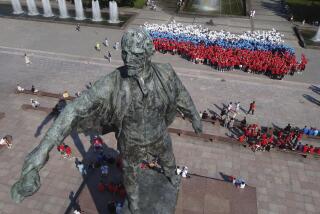Perestroika’s Billowing Sails : Soviet Conservatives Now Know Which Way the Wind Blows
- Share via
OXFORD, England — It is a striking feature of the Soviet Union today that faster progress is being made in political rather than in economic reform. Before Mikhail S. Gorbachev’s perestroika, the two most actively reformist communist countries were Hungary and China. But their reforms began with the economy and for a long time did not venture beyond that sphere. In the Soviet Union, in contrast, notwithstanding some new economic thinking, actual implementation of economic reform is, so far, not keeping pace with Gorbachev’s bold political moves.
The latest changes in Moscow are important not only because they strengthen Gorbachev’s personal position and because, in the space of two days, they have brought about a remarkable turnover in the Soviet top leadership team. Their significance lies also in the radical nature of the restructuring and reduction in the size of the central party bureaucracy, the power center of the entire Soviet system.
On the personnel side, the new moves undoubtedly enhance Gorbachev’s authority and the chances of his views prevailing in policy debates. They do not, however, amount to a clean sweep or a coup d’etat , which is the way they have been portrayed in some sections of the Western media. Gorbachev has taken another substantial step forward, but he is far from being a dictator.
Taken as a whole, the events of Friday and Saturday clearly mark further progress by Gorbachev and the reformist elements in the party leadership. Gorbachev himself has succeeded Andrei A. Gromyko as the nation’s president. At present that merely underlines his authority, rather than adding greatly to it. But next spring the office of head of state is to be accorded broader executive functions, and so the fact that it now has been given to Gorbachev assumes a greater significance.
In shifting the balance of power within the leadership in the direction of Gorbachev and the reformers, the demotions are even more important than the promotions. Though on the face of it, Yegor K. Ligachev did not suffer a major demotion (he is still a full member of the Politburo and a secretary of the Central Committee), the fact that his powers and functions were trimmed at all is a useful reminder of the way the wind is blowing for those in the party tempted to set sail on a course charted by anyone other than Gorbachev. Ligachev has cast doubt on the extent of glasnost , on according a larger place in the economy to market relations and on the subordination of a “class approach” to global “all-human” considerations in international affairs. Previously, his wide supervisory responsibilities within the Secretariat gave him the excuse to stake out his more conservative position on a broad range of issues. Now his sole responsibility appears to be agriculture. If he cannot make the latest agricultural reforms work, his next move is likely to be into the swelling ranks of political pensioners.
Of the five people who were dropped completely from the party leadership, four clearly belonged to its more conservative wing. The two full members of the Politburo to go, the almost legendary survivor Gromyko and the lackluster Mikhail S. Solomentsev, were voices for caution rather than innovation in policy discussion.
The odd one out among the retirees is Anatoly F. Dobrynin. Because of the success he made of his job as Soviet ambassador to the United States from 1962 until 1986, his weight as a politician over these past 2 1/2 years has tended to be overrated by Americans. Contrary to the expectations of many, he counted for much less than Eduard A. Shevardnadze, despite the latter’s initial lack of any foreign-policy experience. Shevardnadze is, like Gorbachev himself, an innovator by instinct and a politician to his fingertips.
“New thinking” should now be well and truly dominant in Soviet foreign policy, for with Alexander N. Yakovlev’s appointment to chair the new Central Committee commission on international policy (taking in relations with both the communist and non-communist world), the triumvirate of the most committed advocates of perestroika in the Politburo--Gorbachev, Shevardnadze and Yakovlev--reigns supreme in that sphere.
The main beneficiary, of course, is Gorbachev and--along with him--the process of change in the Soviet system and its foreign policy that he has been attempting to push through. His supporter, Georgy P. Razumovsky, who was previously the junior secretary in charge of the party apparatus while Ligachev was the senior one, is now head of the Central Committee commission with responsibility for party workers. He will report directly to Gorbachev. This will facilitate the task, albeit still a difficult one, of bringing in more reform-minded officials at the middle and lower-levels of the party hierarchy.
The path of reform remains strewn with many obstacles, but a lot of skillful political work behind the scenes by Gorbachev had its culmination at the end of last week, and at least some of the human and organizational impediments to the progress of perestroika have been removed.
More to Read
Sign up for Essential California
The most important California stories and recommendations in your inbox every morning.
You may occasionally receive promotional content from the Los Angeles Times.













